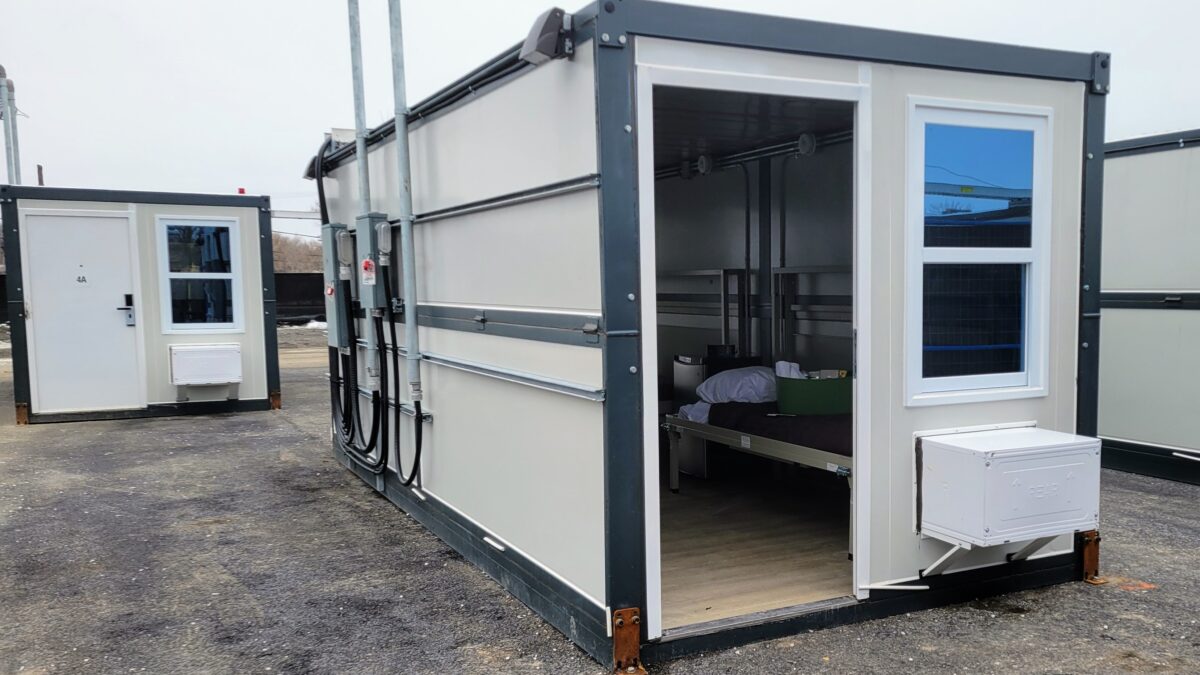Sudbury’s City Council discussed a range of options to respond to homelessness during its July 15 meeting and decided against adding tiny homes to its continuum of housing options.
I took note of how CBC’s Sudbury bureau reported Sudbury’s General Manager of Community Well-being Tyler Campbell as indicating that ‘cities like Hamilton are phasing out tiny homes.’
Having reviewed the debate, the comment was that Hamilton is now trying to determine how it will eventually phase out the “temporary” Barton/Tiffany tiny shelter project.
The City of Hamilton built the “temporary” tiny shelters without having a plan for how and when they will be closed.
(For example, will the Barton/Tiffany residents be prioritized for rent-geared-to-income housing over individuals who’ve been waiting for years on the access to housing waiting list?)
Content
Campbell noted that building tiny home communities is challenging. He cited Hamilton’s procurement fiasco. The original project capital budget was $2.8-million. Hamilton spent $7.9-million.
The primary cause of Hamilton’s failure was the decision to give a sole-source non-competitive contract to a newly incorporated company with no experience providing tiny shelters.
The City of Hamilton decided to hire Microshelters Inc because the company self-identified as being Indigenous-owned. The City hoped to purchase “awards” as the first municipality to use an Indigenous company to purchase tiny shelters.
Microshelters Inc. is now being sued by experienced tiny shelter provider Foldum for allegedly stealing Foldum’s intellectual property.
Microshelters purchased the shelters from a Chinese manufacturer. Due to Microshelters lack of expertise, the City of Hamilton decided on responsibility for shipping, duties, and taxes. Additionally, the shelters had to be modified to meet Ontario’s electrical and building codes.
What Was Said in Sudbury
In summary, Campbell’s remarks were that he cautioned against establishing a municipally-operated tiny homes community because they are costly to build, have similar operating costs as permanent supportive housing, and the structures are temporary.
He recommended that Sudbury focus on projects that are permanent.
He remarked that Hamilton is now beginning to plan for how it will end the Barton/Tiffany project.
“They are, as noted, time-limited in nature.”
“In Hamilton’s case, it was time limited, and they’re looking at what’s the potential exit strategy in the coming years.”
I’ve posted a video copy of the debate here.
Production Details
v. 1.0.0
Published: July 27, 2025
Last updated: July 27, 2025
Author: Joey Coleman
Update Record
v. 1.0.0 original version


The tiny homes project in Hamilton helped about 60 homeless people get out of encampments. Unfortunately the City of Hamilton’s poor fiscal management and lack of transparency has prompted many to question the project instead of those responsible for the faulty and allegedly corrupt process.
Cabin communities are the perfect tool to help many people to exit homelessness, but they have to be run properly. We saw many successes with our cabin community in Kingston, Ontario. However, the inconsistent municipal support made them challenging to operate. The people we were helping were the easy part. I continue to receive requests from people deprived of housing to get into a cabin, despite the program having to close Sept 2024 due to lack of operating funds.
Too many times, operators of homelessness initiatives use authoritarian, patronizing approaches which institutionalize people. If we truly want to help people exit homelessness, we need to empower them, create environments where they can practice making their own decisions and include them in decisions about them.
Hamilton’s failed example is evidence incompetence, and should not be used as evidence that cabin communities don’t work. Look to BC with their expanding use of cabin communities, and more importantly, ask the people who are trying to survive without a home.
The issue with the Hamilton project was that it was miss managed from the start. A reputable company would of responded with a RFP outlining all the costs before the project started. Check out Continest Canada for success stories.
Housing will always be a concern to winter weary Canadians, Northern fire evacuees and refugees. It may be appropriate for Canadian provinces to develop building standards for these type of structures. I would then hope that the funds go to local training and building initiatives. To think that we send property tax dollars on plastic trailers that come from China and are designed in the US seems sad to me. If you can build a log cabin and stay warm think about what you could build with Canadian tin, insulation, copper wire and lumber.
There is a tiny home builder that designs and provides much better quality homes at a much less expensive cost. Why Hamilton Mayor and council went with a vastly inferior and far more expensive builder has never been addressed. The homes were nowhere near done for the agreed timeframe has also not been properly addressed.
I live in the Hamilton area and this is the first I’ve heard that they’re winding it down. There hasn’t been a word out of city hall.
It could have been a good thing and has been done successfully elsewhere, Hamilton totally botched it.
Too bad you turned to Hamilton as an example.
This is correct, City Hall has not shared any information regarding when/how this “temporary” outdoor shelter will end.